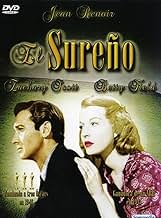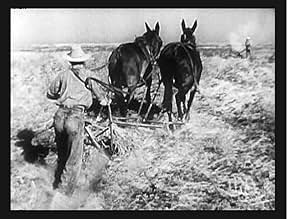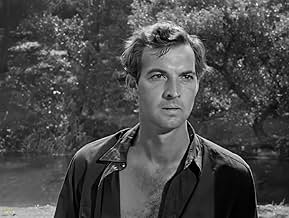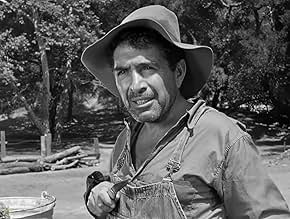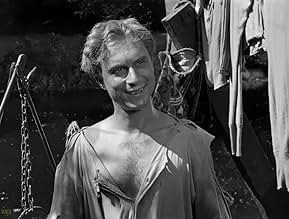NOTE IMDb
7,1/10
4,1 k
MA NOTE
La vie de la pauvre famille Tucker dont les membres travaillent comme bourreurs de coton et qui décident de s'installer à leur compte, mais la nature est contre eux.La vie de la pauvre famille Tucker dont les membres travaillent comme bourreurs de coton et qui décident de s'installer à leur compte, mais la nature est contre eux.La vie de la pauvre famille Tucker dont les membres travaillent comme bourreurs de coton et qui décident de s'installer à leur compte, mais la nature est contre eux.
- Réalisation
- Scénario
- Casting principal
- Nommé pour 3 Oscars
- 3 victoires et 3 nominations au total
Paul E. Burns
- Uncle Pete
- (as Paul Burns)
Audley Anderson
- Townsman
- (non crédité)
Rudy Bowman
- Townsman
- (non crédité)
Avis à la une
An employee named Sam Tucker (Zachary Scott)frequently working for others is hired some land and he decides along with his family, -his wife (Betty Field), granny (Beulah Bondi)and two sons - attempt farming for themselves. The family finds hardships on their way and they'll have to fight against the elements,ills, poorness, distresses and a selfish neighbor (J. Carroll Naish) living with his daughter (Nash) and niece (Norman Lloyd) .
This is a rural drama about a survival fight amid all disgraces and terrible elements. It's a naturalistic drama splendidly played and magnificently staged. From the tale 'Hold Autumn in your hand' by George Sessions Perry and writing by William Faulkner though he appears uncredited. It's proceeded in similar style to ¨Grapes of wrath¨ by John Ford based on John Steinbeck novel . First rate performances by all star cast. Special mention to Belulah Bondi as sympathetic and and grumpy granny. And Norman Lloyd as roguish nephew, he's a veteran player still acting , who joined the original company of Orson Welles-John Houseman Mercury Theatre and after that he was hired to Hollywood to play as secondary actor in Alfred Hitchcock movie and other ones and made him an associate producer. Neo-realist and evocative cinematography by Lucien Andriot. Sensible and imaginative musical score by Werner Janssen.
The flick is excellently directed by Jean Renoir. He said about 'The Southerner' gave him more pleasure than any of his other Hollywood work. Renoir was voted the 12th greatest director of all time . Furthermore, Orson Welles frequently cited him as the greatest movie director of all time. He was son of the famous impressionist painter Auguste Renoir. After his French classics (Rules of game 1939, Human beast 38, La Marseillase 36, A day in the country 36, Boudu saved from drowning 32), he was brought to USA by American producers, directing awesome films in Hollywood (Woman on the beach 1947 , The diary of a chambermaid 46, The Southerner , The land is mine 43, Swamp water 1941). Later on, he returned to France , going on film-making classic movies (Elusive corporal 1962, Picnic on the grass 59, Testament of Dr Cordelier 59, Golden coach 52, The river 1951). Rating : Better than average, well worth watching.
This is a rural drama about a survival fight amid all disgraces and terrible elements. It's a naturalistic drama splendidly played and magnificently staged. From the tale 'Hold Autumn in your hand' by George Sessions Perry and writing by William Faulkner though he appears uncredited. It's proceeded in similar style to ¨Grapes of wrath¨ by John Ford based on John Steinbeck novel . First rate performances by all star cast. Special mention to Belulah Bondi as sympathetic and and grumpy granny. And Norman Lloyd as roguish nephew, he's a veteran player still acting , who joined the original company of Orson Welles-John Houseman Mercury Theatre and after that he was hired to Hollywood to play as secondary actor in Alfred Hitchcock movie and other ones and made him an associate producer. Neo-realist and evocative cinematography by Lucien Andriot. Sensible and imaginative musical score by Werner Janssen.
The flick is excellently directed by Jean Renoir. He said about 'The Southerner' gave him more pleasure than any of his other Hollywood work. Renoir was voted the 12th greatest director of all time . Furthermore, Orson Welles frequently cited him as the greatest movie director of all time. He was son of the famous impressionist painter Auguste Renoir. After his French classics (Rules of game 1939, Human beast 38, La Marseillase 36, A day in the country 36, Boudu saved from drowning 32), he was brought to USA by American producers, directing awesome films in Hollywood (Woman on the beach 1947 , The diary of a chambermaid 46, The Southerner , The land is mine 43, Swamp water 1941). Later on, he returned to France , going on film-making classic movies (Elusive corporal 1962, Picnic on the grass 59, Testament of Dr Cordelier 59, Golden coach 52, The river 1951). Rating : Better than average, well worth watching.
I have a copy of this movie and have watched it several times. Most of my family has as well. My father has a speaking part in the movie. His name is Isadore J. Blanco and is the 17 year old that is featured while working out in the field. My father passed away On Veterans Day November 12, 1996. He was a wonderful human being and it's a joy to be able to see and hear him speak as a teenager.
Many of the younger generation do not know of the lives of these poor field working families. Many of the older children did not complete elementary school because working to put food on the table was much more important. Survival was what drove these families. Many young men later enlisted in the military to better their lives.
Many of the younger generation do not know of the lives of these poor field working families. Many of the older children did not complete elementary school because working to put food on the table was much more important. Survival was what drove these families. Many young men later enlisted in the military to better their lives.
Life in Renoir films is always one damned thing - or one absorbing incident - after another, which is why the ideal Renoir film (a) sticks to the one subject, or the one place ("Grand Illusion" WOULD be as great as everyone says it is, if only it didn't wander about so), and (b) doesn't even purport to have a plot. (Not that the second requirement matters so much as the first.) In any case, the material Renoir had here suited him down to the ground. The fact that the central character is tied to the land, the fact that he has a clear goal (to survive by means of farming) without having any particular quest, allows Renoir to let whatever will happen, happen, without there being any danger of the film falling apart.
A delightfully warm film, but one with a real bite. It carries a real charge when the established farmer, after treating the newcomer with such unjustified coldness you start to feel he must be positively evil, begins to reveal his humanity and open up a little - only to describe, in detail, why he's so bitter - and determined to remain bitter. But this is just one perfectly realised scene among many. There's so MUCH to this film, not one segment of which could profitably be lost - except, of course, the minute-long spoken prologue, which contributes about as much to the overall effect as Cecil B. DeMille's anti-communist rant contributes to "The Ten Commandments". But ignore that last nit-pick.
A delightfully warm film, but one with a real bite. It carries a real charge when the established farmer, after treating the newcomer with such unjustified coldness you start to feel he must be positively evil, begins to reveal his humanity and open up a little - only to describe, in detail, why he's so bitter - and determined to remain bitter. But this is just one perfectly realised scene among many. There's so MUCH to this film, not one segment of which could profitably be lost - except, of course, the minute-long spoken prologue, which contributes about as much to the overall effect as Cecil B. DeMille's anti-communist rant contributes to "The Ten Commandments". But ignore that last nit-pick.
Beautifully shot, absorbing film about the close-knit Tucker clan - Sam (Zachary Scott), the handsome dad who loves being a farmer, Nona (Betty Field), a good wife and mother who always seems to look well-groomed in spite of her hard work, two really cute kids, and then there's ornery old Granny (Beulah Bondi), she of the sharp tongue and stubborn will. In a gorgeously photographed scene where they are working for hire in the bright, sunlit fields picking cotton - the couple watches as their Uncle dies in the fields saying in his last breath "Grow your own crops", and they decide to do just that. Soon they have rented a property where they can raise cotton and be their own masters, so to speak - well, the house turns out to be nothing but a broken-down, ramshackle shack, the whole place needs loads and loads of work - but one good thing" it has "good earth". Troubles ensue - trouble with the neighbors, trouble getting food, sickness troubles, weather troubles, oh brother!
Well, this is an excellent, heartfelt, and well photographed film done in an unusual, distinctive style. The actors who play the Tucker family do a good job in making this actually seem like a real family and make you want to root for them - but it is Beulah Bondi as cantankerous Granny who really steals this film for me - I really enjoyed her scenes and thought they added a little spice to this! The hardships this clan has to go through can be hard to watch sometimes, but the story is involving and the film is quite memorable.
Well, this is an excellent, heartfelt, and well photographed film done in an unusual, distinctive style. The actors who play the Tucker family do a good job in making this actually seem like a real family and make you want to root for them - but it is Beulah Bondi as cantankerous Granny who really steals this film for me - I really enjoyed her scenes and thought they added a little spice to this! The hardships this clan has to go through can be hard to watch sometimes, but the story is involving and the film is quite memorable.
THE SOUTHERNER is notable for giving ZACHARY SCOTT his first real chance to shine as a promising new movie actor headed for stardom, teaming him with the always reliable BETTY FIELD as the wife of a dirt poor farmer in this Depression-era saga, uplifting despite the adversity of their situation due to Jean Renoir's fine direction.
"Grow your own crop," Scott, a Texas farmer, is told by his dying uncle. He struggles with his family to do just that--and THE SOUTHERNER becomes a tale of survival against the cruel twists and turns of nature. BEULAH BONDI is the stubborn Granny whose bark is worse than her bite, but she does tend to get annoying in her whining ways.
Working the land and making farmland self-supporting is never an easy matter and it gets plenty of negative treatment here with the odds against the struggling family at every turn. J. CARROLL NAISH and NORMAN LLOYD as hard-nosed neighbors make themselves utterly unlikeable (but believable) as Scott's uncooperative neighbors, unwilling to spare some milk for him when his son is ill. PERCY KILBRIDE comes to his rescue with a rented cow and later becomes his father-in-law, marrying BLANCHE YURKA.
But there are still hardships ahead, including a severe storm that destroys all the crops, serving to emphasize the man against nature theme of the entire story. Everything is destroyed but the human spirit.
Scott, Field and Bondi give heartfelt performances, with Bondi a bit over-the-top as Granny. It's not in the same class with THE GRAPES OF WRATH but it does create a sympathetic portrait of farmers who work the land.
Based on a novel called "Hold Autumn in Your Hand", it stands the test of time largely because of the performances.
"Grow your own crop," Scott, a Texas farmer, is told by his dying uncle. He struggles with his family to do just that--and THE SOUTHERNER becomes a tale of survival against the cruel twists and turns of nature. BEULAH BONDI is the stubborn Granny whose bark is worse than her bite, but she does tend to get annoying in her whining ways.
Working the land and making farmland self-supporting is never an easy matter and it gets plenty of negative treatment here with the odds against the struggling family at every turn. J. CARROLL NAISH and NORMAN LLOYD as hard-nosed neighbors make themselves utterly unlikeable (but believable) as Scott's uncooperative neighbors, unwilling to spare some milk for him when his son is ill. PERCY KILBRIDE comes to his rescue with a rented cow and later becomes his father-in-law, marrying BLANCHE YURKA.
But there are still hardships ahead, including a severe storm that destroys all the crops, serving to emphasize the man against nature theme of the entire story. Everything is destroyed but the human spirit.
Scott, Field and Bondi give heartfelt performances, with Bondi a bit over-the-top as Granny. It's not in the same class with THE GRAPES OF WRATH but it does create a sympathetic portrait of farmers who work the land.
Based on a novel called "Hold Autumn in Your Hand", it stands the test of time largely because of the performances.
Le saviez-vous
- AnecdotesBased on the novel "Hold Autumn in your Hand", by George Sessions Perry, which won the first National Book Award in 1941.
- GaffesWhen Finley whipped the cows the dog disappeared for a second Indicating a film cut.
- ConnexionsEdited into 365 days, also known as a Year (2019)
Meilleurs choix
Connectez-vous pour évaluer et suivre la liste de favoris afin de recevoir des recommandations personnalisées
- How long is The Southerner?Alimenté par Alexa
Détails
Box-office
- Budget
- 750 000 $US (estimé)
- Durée
- 1h 32min(92 min)
- Couleur
- Rapport de forme
- 1.37 : 1
Contribuer à cette page
Suggérer une modification ou ajouter du contenu manquant



